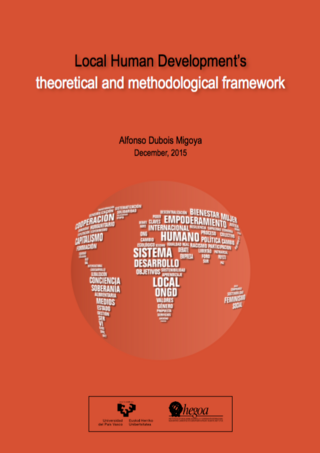

Our research team, which belongs to the Hegoa Institute, has adopted the local human development (LHD) approach as a theoretical and normative guide for the study and creation of development strategies. This text presents the theoretical and methodological elements considered relevant when it comes to applying this approach to research into specific experiences.
The proposal to begin with the local dimension in order to confront the imbalances of globalization has taken on particular relevance in recent years and this has been seen in many initiatives in the field of development policies. With this proposal, an action plan is proposed for local communities (at their different levels) which seek the genuine development of people and groups within the situation of globalization. The goal is to empower the local community in such a way that it can exercise greater control over the mechanisms that define its development conditions, not simply to consider development as an option or a defence, but as a new way of building global society.
Creating a theoretical and methodological framework is essential for work on an alternative view of development. If we do not have categories and instruments that allow us to understand and alter reality from the perspective of human development, it is impossible to make progress in terms of its construction. This is the challenge set by the proposal of this framework: to offer elements for understanding reality and to have available instruments in order to intervene in it.1
Creating the methodology is not an abstract process but rather necessarily refers to the context, since it has to be able to help answer the questions put by reality. Therefore, the methodology is fed by and faces up to the problems that this reality presents. Its starting point is that we are currently facing profound changes in which the responses that were formerly applied are no longer effective, because they were
responses to questions posed in another context. The rupture between contemporary experience and traditional thought obliges us to return to the questions. This involves identifying the new questions to be asked; questions that do not arise from abstract concerns but from the effort to understand the “extraordinary events of this century”. The methodology needs to be both operative and open, and it requires these characteristics in order to be applied to a changing local and global setting. Furthermore, the methodology must be constantly revised in order to be consistent with the challenge of offering an alternative focus, given this changing context.
Introduction
I. Revising development
1. The crisis and the development debate
2. The central tasks: rethinking development from the ethical dimension
3. Revising the concept of wellbeing
II. The normative aspect of human development: the concept of wellbeing
1. The theoretical basis: the capability approach
2. Human development and women
3. The definition of human development in the UNDP Reports
4. The individual dimension of wellbeing
5. The social or collective dimension of wellbeing
III. The capacity development (CD) process
1. Background: from technical cooperation to capacity development
2. The concept of capability: institutional consensus about capabilities and capacity development
3. Capacity development within human development
4. CD principles
IV. System capacity
1. Complexity as a challenge and as a methodological proposal
2. Inadequacy of traditional tools and the need for new theoretical guidelines: the complexity theory proposal
3. Complexity and development
4. The categories of complexity applicable to development
5. Resilience: central category
6. Categories and the social change process
7. The system’s central capacities
V. Collective capabilities
VI. The analytical framework’s methodological proposal
1. Introduction. Broad proposals for local development
2. The Local Human Development (LHD) approach
2.1. The framework’s general characteristics
2.2. Central categories
3. Wellbeing attainment processes
3.1. Analysis of wellbeing attainment processes
3.2. Process models
3.3. The framework of wellbeing attainment processes: Market, State and Society (Community and Household)
4. Wellbeing results
4.1. Individual wellbeing
4.2. Social wellbeing
Bibliography